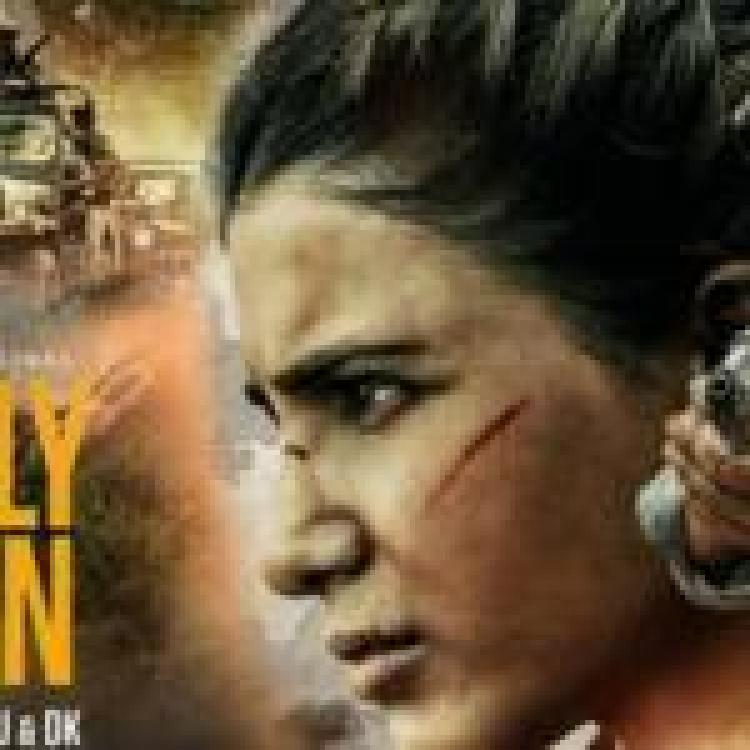![]()
‘The Family Man 2’, an Indian web series, attracted a great deal of criticism from Tamils across the world. Its semi-fictional portrayal of a rebel group based in Sri Lanka, undoubtedly modelled on the Liberation Tigers of Tamil Eelam (LTTE), angered many Tamils because it was seen as demonising the Tamil liberation struggle. This outpouring of collective indignation speaks to a resurgence Tamil nationalist politics, not just in Tamil Eelam and the diaspora, but also across Tamil Nadu. Social media platforms served as an effective ground for expressions of resentment with the web series and an even more emphatic support for the liberation struggle.
When did it all start?
Public opposition was sparked off on May 19 by the release of the trailer of the web series which contained indications that the series might belittle the liberation struggle and Eelam Tamils in general. Particularly, actor Samantha Akkineni’s dialogue, who plays a Tamil rebel in the series, that says “I will kill everyone” gave the impression that the series portrayed the Tigers as an arbitrarily murderous outfit, rather than as an armed resistance movement. The trailer also suggested that the Tigers were collaborating with the Pakistani ISI agency, lending further proof to Tamils’ anxieties that the series was bent on giving rise to an anti-Tamil feeling in the Indian Union.
Tamil netizens took to Twitter and other social media to rail against the web series and called for a boycott on it using the hashtag #FamilyMan2_against_Tamils. Many also encouraged a mass unsubscription to Amazon Prime, the platform in which The Family Man was streaming. Actor Samantha also drew criticism for her decision to play a role demeaning to Tamils, despite having grown up in Chennai and becoming popular through Kollywood. The intensity of the backlash spread from social media to official statements and letters by Tamil Nadu politicians seeking a ban on the series. The Tamil Nadu government wrote a missive to Union Minister of Broadcasting Prakash Javadekar asking for an official Indian government’s ban on the series, as did Parliamentarian Vaiko. Naam Tamilar Katchi (NTK) leader Senthamizhan Seeman called for a ban and warned of “dire consequences” if the show was released.
No substantive action was taken officially against the web series. Meanwhile, the makers and actors maintained silence for a while until the directors said that Tamil concerns would be allayed as soon as they got to watch the complete series.
What happened after the release?
If anything, the release of the series on June 4 only aggravated the tensions as it became certain to many that its portrayal of the Eelam liberation movement was misleading, and had been sensationalised in an insensitive manner. Besides the apparent link between the fictitious rebels and Pakistani ISI, a number of other factors engendered greater resentment. For instance, the rebel chief named Bhaskaran is shown as joining hands with the ISI in order to avenge India’s assassination of his brother by killing the country’s Prime Minister. This incensed Tamils as they saw it not just as a distortion of history, but also as an attempt to reduce the liberation struggle to a story of personal vengeance.
While the LTTE were notorious for their strict social discipline, and outlawing of alcohol, drugs and smoking among the ranks, Raji, the character Samantha plays, is shown to trade sexual favours and the rebels cadre are depicted as indulging in alcohol unreservedly.
Prominent Tamil YouTube channel Pesu Tamizha Pesu released a video enumerated the Family Man 2’s distortions of the armed conflict and its series of affronts to the Tamil people. Opposition to the series galvanised at great speed with many calling on Amazon Prime to remove it from its platform. That the series sometimes contained positive references to the Tamil side of the armed struggle did little to placate the deepening disapprobation.
Samantha then posted a picture of herself in combat fatigues on Instagram, taken during the filming of the series and explained that she knew “portraying Raji’s character required sensitivity and balance.”
She further wrote:
"When [Raj & DK] approached me to do the character, I was aware that portraying Raji's character required sensitivity and balance. The creative team shared documentaries of the Tamil struggle that included stories of women in the Eelam war. When I watched those documentaries, I was aghast and shocked by the troubles and unspeakable grief that the Tamils of Eelam went through over an extended period of time. I noticed that the aforementioned documentaries had only a few thousand views and that is when it dawned on me how the world just looked away when tens of thousands people of Eelam lost their lives. And, lakhs more lost their livelihood and their homes. *Countless many* continue to live in far away lands with the wounds of the civil strife still fresh in their hearts and minds.
Raji's story, though fictional, to me, is a tribute to those that died because of an unequal war, and those who continue to live in the painful memory of the war. I was particular about Raji's portrayal being balanced, nuanced, and sensitive. I want Raji's story to be a stark, much-needed reminder for us, more than ever before, to come together as humans to fight hate, oppression, and greed. If we fail to do so, countless more will be denied their identity, liberty, and their right to self-determination."
Though Samantha’s post did little to mollify the outrage against the series' misrepresentations of the Tamil armed struggle, some appreciated the actress's acknowledgement of the suffering of the Tamils of Eelam and the 'unequal' war which led to the genocide.
However criticism remained that Samantha's character was a racist caricature of an Eelam Tamil woman, aggravated by the 'blackface' makeup she was given.
Previous incidents
A similar backlash also gathered last year against a Tamil biopic of Sri Lankan cricketer Muttiah Muralitharan. Popular Kollywood star Vijay Sethupathi had signed up to play the role of the sportsman which triggered widespread disapproval. Muralitharan’s close links to the Rajapaksas and pro-Sri Lankan military stance in the armed conflict alienated much of the Tamil population against him. After a massive outcry against an adored Tamil actor playing Muralitharan emerged, the project was called off. However, Vijay Sethupathi’s decision to accept the role was widely seen as typical of Kollywood and Indian cinema’s ignorance (and sometimes outright bias) with regards to the armed conflict.
Earlier, Indian-made movies like Madras Cafe (2013) and Inam (2014) also attracted a lot of criticism for their inaccurate portrayal of the liberation struggle.
Political significance
This episode of protest against The Family Man 2 reflects a key pattern in contemporary Tamil nationalist discourse which has emerged only recently - a growing stream of supporters of the ideology in Tamil Nadu. Such a huge outpouring of Tamil nationalist sentiment, particularly amongst the tech-savvy youth in the state, speaks to a substantial growth in adherents.
Indeed, the opposition to the series on social media was accompanied by an equally forceful endorsement of the LTTE. Scores of netizens expressed their support to the organisation by recollecting its chief Prabhakaran. Last Thursday the hashtag #TamilsPrideLTTE trended across India on Twitter as tens of thousands of tweets poured in from Tamil Nadu in favour of the organisation. This development can be best seen in the creation of Methagu, a film created by a Tamil Nadu director that depicts the early years of LTTE supremo Velupillai Prabhakaran. The movie portrays the development of Sinhala-Buddhist chauvinism right through the 1950s and 1960s and the attendant anti-Tamil pogroms in the island that pushed Tamils towards militancy. Although it has been facing challenges in its release, Methagu demonstrates the urge felt within Tamil Nadu to do away with the grim portrayal of LTTE and Eelam in popular culture.
This saga also represents the pivoting of the Tamil nationalist ideology to the heart of political discussion and debate in the state. Previously confined to intellectual circles and appearing only in the wilderness of the political sphere, the ideology has taken rapid strides towards the mainstream. Until a few years ago, the LTTE itself was seen in a detached manner, a product of the unique and disparate political circumstances in Eelam with only a mild impact on Tamil Nadu politics. At present, however, the history of the armed conflict for Eelam and the plight of Eelam Tamils have come to command significant sway amongst the Tamil Nadu populace.
The Naam Tamilar Katchi (NTK), a Tamil nationalist party, is a key driver of this surge. It polled over 3 million votes in the recent State Assembly elections running on an assertive nationalist platform with images of Prabhakaran abounding in its campaign. The currency of the ideology has also prompted other parties to identify themselves with it as evidenced by the DMK government’s letter to the Union requesting a ban on Family Man 2. However, it has also caused fear in the establishment due to its frequent references to the DMK’s inability to use its power in New Delhi to bring a halt to the genocide of Tamils in 2009. With DMK having come to power with a comfortable majority, it might attempt to repress any criticism of its previous actions related to the Eelam movement. At the time of writing, a wildly popular Tamil Youtuber has just been arrested by the Trichy Police for allegedly “intimidating” a person who insulted Prabhakaran on social media. What impact this ideological confrontation between Tamil nationalism and Dravidianism might have for the future of Tamil Nadu politics remains to be seen.


